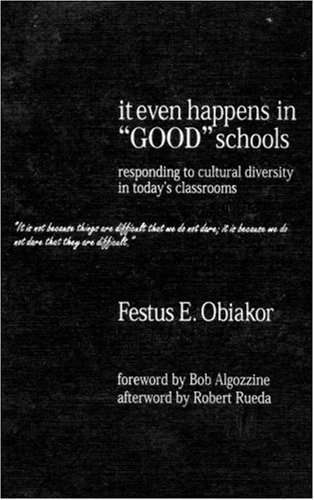It Even Happens in Good Schools Responding to Cultural Diversity in Today's Classrooms
Festus E. Obiakor, Ph.D., is the Chief Executive Manager, Sunny Educational Consulting, Shorewood, Wisconsin. He has served as Department Head and Professor, Valdosta State University, Valdosta, Georgia and The City College of New York, New York. A teacher, scholar, leader, and consultant, he has served as Distinguished Visiting Professor at a variety of universities. He is the author of more than 150 publications, including books, articles, and commentaries; and he has presented papers at many national and international conferences. He serves on the editorial boards of reputable nationally and internationally refereed journals, including Multicultural Learning and Teaching (MLT) in which he serves as Executive Editor. Dr. Obiakor is a leader who has been involved in many landmark scholarly works in the fields of general and special education, with particular focus on African American and other culturally and linguistically diverse (CLD) learners and he continues to prescribe multidimensional methods of assessment, teaching, and intervention for these individuals. Based on this premise, Dr. Obiakor created the Comprehensive Support Model (CSM), an intervention model that values the collaborative, consultative, and cooperative energies of students, families, teachers/service providers, communities, and government agencies. ... Read more Read less
This book responds to the critical question, What is a 'good' school?' The author believes that a good' school is a learning community that maximizes the potential of all of its students whether they are White, Black, Hispanic, Asian, or Native American. A school cannot be a good' school when some of its students are misidentified, misassessed, miscatagorized, misplaced, and misinstructed. We cannot and should not define good' schools only from the perspective of student performance on standardized tests. A good' school should take a holistic approach to education: considering each student's needs academically, socially, emotionally, culturally, and globally. This book is punctuated with case studies, observations, solutions, and key points that should be invaluable in efforts to reform, restructure, and improve schools by translating research, resources, and rhetoric into fundamentally sound, culturally responsive' professional practice. ... Read more Read less











